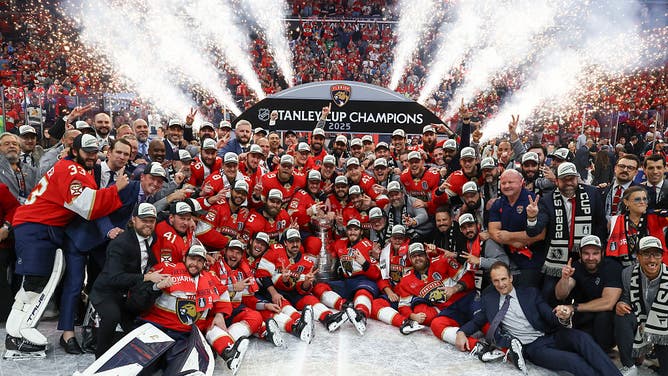Here's Why The NHL State Tax Debate Is One Of The Dumbest In Sports
Teams in states without state-level income tax have won the Cup five of the last six seasons
The Florida Panthers are back-to-back Stanley Cup champs, which I think officially makes Florida the new State of Hockey (sorry, Minnesota), but it also makes sure that one of the most ridiculous debates in all of sports will continue.
So, last night after sitting on the couch watching the Cats annihilate the Oilers on the back of a monster performance from Sam Reinhart as rubber rats came raining onto the ice, I went up to bed and as soon as I did, I was already seeing people pointing out that in five of the last six seasons, the Stanley Cup has been won teams in states without state tax.
Now, with a Panthers win, this dumb issue will probably continue coming up.
The Tampa Lightning won the Cup in 2020 and 2021, the Vegas Golden Knights won it in 2023, and the Panthers won it in 2024 and now 2025. Since they play in Nevada and Florida, some argue that this gives those teams an edge because the lack of state tax means that players who accept a deal with them make more money than if they accepted a deal with a team in a state with state income tax.
It's a ridiculous debate for a couple of reasons.
As Commissioner Gary Bettman noted, this issue never came up when the Lightning and Panthers were bad (Vegas has never been that bad, but they haven't even been around for a decade yet; their time will come).
It's also an argument that tends to overlook teams like the Seattle Kraken and Nashville Predators, who play in no-income tax states, yet failed to even make the postseason.
In fact, no team was more aggressive in free agency — when the lack of tax should be the biggest advantage — last summer than the Predators, and they were awful this season.

The Stanley Cup staying in state-income-tax-free Florida means the dumbest debate in sports will rage on. (Photo by Peter Joneleit/Icon Sportswire via Getty Images)
Runs Of Dominance Are Common, Taxes Or Not
People also like to argue that this six-year stretch of teams from no-income-tax states winning Cups is proof that they have an advantage. They say that this run of dominance is irrefutable evidence that a change needs to be made.
But runs of dominance by a small handful of teams aren't unusual at all; in fact, it's kind of the norm.
Take a look at the last 50 years of Cup winners.
From 1976 to 1990, the Stanley Cup was dominated by three teams: The Canadiens, the Islanders, and the Oilers.
Two of those teams play in Canada, and the other plays in New York, where they have pretty hefty state taxes.
Then, from 1996 to 2003, we had the Avalanche, Devils, and Red Wings dominating.
Colorado, Michigan, New Jersey. Taxes, Taxes, Taxes.
But Matt, that was before the salary cap era, so it's not the same.
Funny you should mention that. Let's look at 2009 to 2017. All but one season ended with the Penguins, Blackhawks, or Kings lifting the Cup.
You pay state income tax in Pennsylvania, Illinois, and especially California.
On top of that, the 2015 and 2017 Finals saw the tax-free, and therefore "advantaged," Lightning and Predators on the losing end (you could also add the 2018 Final to that, which saw the Golden Knights losing to the Washington Capitals).
So, how did these teams overcome that extreme disadvantage to win the Cup? There isn't one.
I see a case of correlation not equaling causation. Just because these teams play in states without state income tax doesn't mean that's why they won. It discounts things like drafting well, being good places to raise families, and being well-run organizations with good locker room cultures that players want to be part of; something that is especially clear with the Panthers.
So, while Bettman was adamant no changes are coming to "level the playing field" — nor should any — the argument will persist until the likes of the Lightning, Golden Knights, and Panthers aren't at the top of the heap.